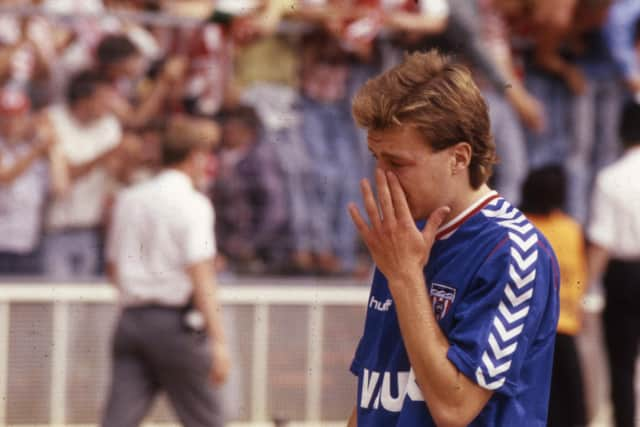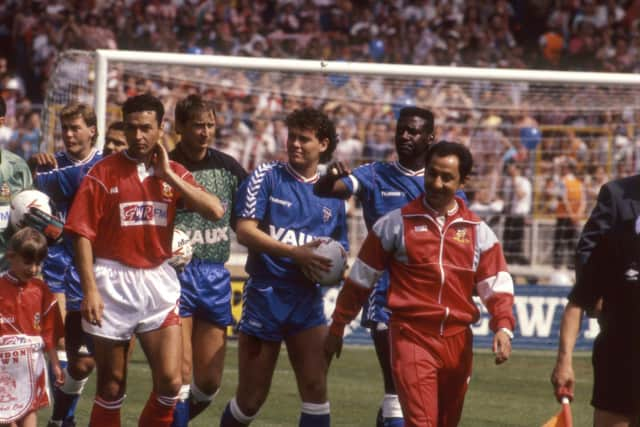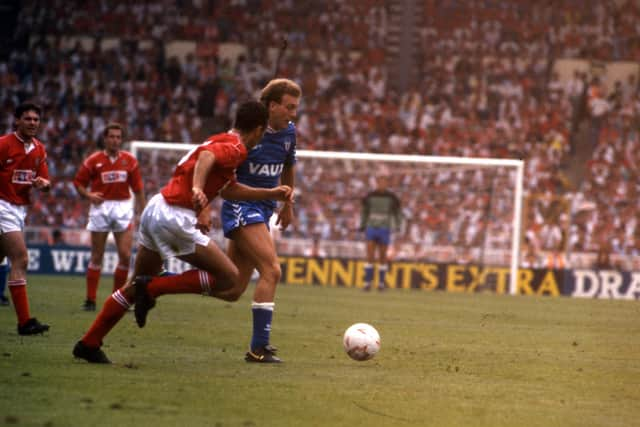Football, finance and furore: The bitter tale of 1990 that engulfed Sunderland AFC, Newcastle United and Swindon Town
and live on Freeview channel 276
“Gary, it’s the club. Get down to the ground. Now.”
It’s the summer of 1990 and Gary Bennett is called to an impromptu photoshoot outside Roker Park.
“I’ve got one of the pictures here in front of me now,” the centre back tells the Echo.


Advertisement
Hide AdAdvertisement
Hide Ad“I had scarves hoisted above my head, even pictures with an umbrella outside Roker Park. It was all celebrating that we’d got promotion.”
Sunderland had indeed won promotion, and at the expense of their rivals - Newcastle United. But this was unlike any promotion ever seen in English football. This was 1990. This was the year when football, finance and the legal system combined to form a perfect storm. This is the bitterest chapter in the infamous rivalry between Sunderland and Newcastle United - told by those at the heart of it.
Painting the picture
To fully understand the significance of this story, we need to go back to the beginning - with football in England reaching a crucial juncture.


With talks already underway over a new breakaway top-flight - later to be named the Premiership - second division clubs were dangled an additional carrot when fighting for promotion.
Advertisement
Hide AdAdvertisement
Hide AdAnd in the 1989-90 campaign, both Newcastle United and Sunderland were vying for a spot in the top tier. Neither were spectacular sides, and were heavily reliant on their respective goalscorers in Marco Gabbiadini and Micky Quinn.
“The thing about us was that we’d always score goals,” recalls midfield general Gordon Armstrong. “With Gatesy [Eric Gates] and Gabbers, there was always a threat there.”
Newcastle came close to promotion, finishing third and narrowly missing out on the top two, while Sunderland squeezed into the final play-off place after a remarkable end to the campaign.


“We went on a very, very good run near the end of the season and we knew there was something to play for,” adds Bennett.
Advertisement
Hide AdAdvertisement
Hide Ad“Okay, we didn’t get promotion - but we knew we had the play-offs.”
As the two prepared to face-off in a play-off semi-final, few could envisage the drama that lay ahead.
Penalties and putting out windows
Yet there was little sign of drama in the first leg. 26,000 fans turned out at Roker Park on a balmy Sunderland evening to watch a drab 0-0 draw which failed to catch the imagination - until the final minute, when Sunderland were awarded a penalty.
“We were rubbing our hands together,” admits Bennett.
“We thought we’d be going to St James’s Park on the Wednesday a goal up.”
Advertisement
Hide AdAdvertisement
Hide AdPaul Hardyman, the club’s designated penalty taker, had already netted nine times throughout the campaign. On this occasion though, he saw his spot kick saved by John Burridge, before being sent-off for lashing out at the Newcastle United stopper. Chaos ensued.
“I knew where he’d put it,” says Burridge. “I’d done my homework and I had written in a book where Hardyman would put it - I blocked it and the next thing I knew I felt my nose go.
“The funny thing is that I lived in Durham city, and Hardyman lived on the same estate.
“He was only round the corner, and I felt like going and putting his f***ing windows out.”
Advertisement
Hide AdAdvertisement
Hide Ad“I always tell Hardy whenever I see him that I think I saved his life that night, because half the Newcastle team wanted to lynch him,” adds Armstrong, who managed to shepherd the full-back off the field.
“He did try and kick Budgie’s head off, to be fair.”
“All hell broke loose after that,” says Bennett. “Newcastle thought they’d just have to turn up on Wednesday and win the game.”
Play-off victory – and a trip to Menorca
Outside expectation was low as Sunderland headed to St James’s Park in the second leg. Four months previously, the Black Cats had ground out a 1-1 draw on Tyneside thanks to a Marco Gabbiadini strike, but on this occasion a stalemate would not be enough. They needed to win.
“I don’t think there’s been a bigger game against Newcastle in the distinguished history of both clubs,” says former Sunderland owner Bob Murray.
“The prize at the end of it all was the first division.”
“The odds were completely against us,” adds Bennett.
Advertisement
Hide AdAdvertisement
Hide Ad“But as a team we played well and we had the G Force - Gates and Gabbiadini - who just terrorised defences all season. They won us the game.”
Gates struck first, pouncing on Gary Owers’ cut-back to stab past Burridge. There was pandemonium in the open air away end. The second then came with just minutes left on the clock, Gabbiadini sliding home in front of the jubilant travelling fans.
But those celebrations were cut short. Newcastle fans spilled onto the pitch from the Gallowgate end, halting play. Referee George Courtney called a halt to proceedings, with both teams retreating to the dressing room. If the home fans had hoped to stop Sunderland’s march to Wembley, their plan had backfired.
Armstrong says: “I remember George Courtney coming into the dressing room and saying ‘look, don’t worry about it - we’re finishing this game tonight. Even if we have to stay here until two in the morning, we’re finishing it.’
“That was good to hear.”
Advertisement
Hide AdAdvertisement
Hide AdThe game was eventually played to a completion (it was a case of ‘playing it on the touchline and making a quick getaway’, according to Bennett) and Sunderland were Wembley-bound.
“We had a great night in Sunderland afterwards,” Armstrong tells us.
“We then went away for four or five days to Menorca… I’ll let you decide whether that was a good idea or not.”
Swindon were then waiting under the Twin Towers, and with them a host of issues.
Meanwhile, in Wiltshire...
Advertisement
Hide AdAdvertisement
Hide AdAs Sunderland were defeating their local rivals, Swindon were breezing past Blackburn Rovers in the other play-off semi-final. It topped off a fine season for the Robins who, under the guidance of Ossie Ardiles, shook off their reputation as a long ball team. In came a new Samba style which took the second division by storm.
“It was sparkling football,” says Vic Morgan, who covered the club for BBC Wiltshire during the 1989-90 campaign.
“The club was successful under Lou Macari but often that was described as long ball football - which is a little bit unfair, really.
“But Ossie Ardiles came in and introduced his South American flair and it was wonderful football to watch.”
Advertisement
Hide AdAdvertisement
Hide AdBut while things were going well on the pitch, a storm was brewing behind the scenes.
As the season drew to a close, the club were hit with a vast number of charges from the FA and Football League - dating back as far as 1985.
There were 35 cases of illegal payments made to players over a four year period, while former team manager Macari and chairman Brian Hillier were also banned from football and heavily fined after betting on Swindon to win an FA Cup tie - ironically, against Newcastle United.
Swindon’s case was supposed to be heard on May 4, before the play-offs, only to be postponed on legal advice. That came after Hillier, Macari and club secretary Vince Farrar were all charged by police for ‘intent to defraud Inland Revenue by making payments without deducting tax or NI’ (Farrar and Hillier were later found guilty, while Macari was cleared).
Advertisement
Hide AdAdvertisement
Hide AdThat added complication meant the case couldn’t be heard until early June - meaning the play-off final would take place before a concrete decision was made.
“They completely bamboozled us”
“People always say I was the first black captain to lead out a league club at Wembley. I’m not sure whether it’s true or not, but leading Sunderland out was a fantastic honour and nobody can take that moment away from me.”
It was a proud day for Bennett as, roared on by over 72,000 fans at the home of football, Sunderland looked to reclaim their place among the elite of English football.
They had already beaten Swindon during the regular season and were considered favourites in many quarters - but the Robins had other ideas. Managed by Argentine Ardiles, Swindon implemented their brand of fluid football - that Sunderland couldn’t cope with.
Advertisement
Hide AdAdvertisement
Hide Ad“We didn’t turn up,” adds Bennett. “We never got going. They played three at the back and we couldn’t deal with their system.
“We were lucky to be beaten 1-0.”
“I think it's the most one-sided 1-0 I've ever seen,” admits Morgan.
“Sunderland didn't trouble Swindon at all because the football was just so good.
“It was a wonderful day. 30-odd thousand people came up from Swindon to watch the game at Wembley and we completely outplayed Sunderland.
Advertisement
Hide AdAdvertisement
Hide Ad“I think Swindon were the deserved winners at the end of it and there were great celebrations when we got back to Wiltshire that night.”
It was club captain Bennett who inadvertently helped to hand the Robins victory, as his deflection saw Alan McLoughlin’s strike beat the otherwise imperious Tony Norman. There were few complaints on the day, with the Black Cats completely overawed.
“They completely bamboozled us,” says Armstrong. “To be fair to them, they should have won more comfortably. If it wasn’t for Tony Norman, they would have.
“They deserved to win...but suddenly, everything changed.”
Bob Murray’s well-kept secret
“I knew.”
Before a ball had been kicked at Wembley, Bob Murray knew what was about to transpire.
Advertisement
Hide AdAdvertisement
Hide Ad“Very few people know this, but before the game at Wembley I was pulled - very firmly - to one side by Bill Fox, the Football League chairman.
“He said that they wanted Sunderland to win because they didn’t want to be forced to make the decision.
“I didn’t even share that with the board, but I knew there was a very good chance we were going to be promoted to the first division. The Swindon thing was such a big black mark. There was going to be severe consequences.”
While Murray kept that knowledge to himself, players - both of Sunderland and other clubs vying for promotion - had their suspicions.
Advertisement
Hide AdAdvertisement
Hide Ad“Everyone knew, or had a feeling, even before a ball was kicked that there were issues with Swindon,” says Bennett.
“We didn’t even know if they’d be allowed to play in the play-offs, and then when they were, there was an investigation going on.”
“I remember Kevin Dillon coming in after we beat Newcastle and congratulating us on promotion, because their chairman had said we were already up,” adds Armstrong.
“He said action was being taken against Swindon and they certainly wouldn’t be going up, and might not even be in the second division next year.”
Advertisement
Hide AdAdvertisement
Hide Ad“It was strange because we were going up the motorway beaten, and I didn’t feel a thing,” admits Murray.
“Things just moved on very quickly after that.”
The final verdict
Armstrong was on holiday in Ibiza with his girlfriend, now wife, when he heard the news.
“She had rang her Mam and she came back and told me - we were promoted.”
It was June 13 - almost three weeks after the final - when Sunderland finally learned their fate. Swindon had pleaded guilty to the 36 charges put to them by the Football League, and admitted a further twenty infringements related to financial irregularities. The Robins were to be denied their promotion - and taking their place in the top flight would be Sunderland.
Advertisement
Hide AdAdvertisement
Hide AdThe verdict was delivered at Villa Park where Morgan, along with a host of Swindon players and backroom staff, waited patiently to learn their fate.
“There was a petition with thousands and thousands of signatures in the corner of the room where they delivered the verdict,” he says.
“I was standing behind the chairman of the Football League as he was delivering the statement, and I read the line before he could even read it out - Swindon would be demoted two divisions. You can imagine what happened in Swindon after that.
“It was a bombshell, and nobody in football had been treated as harshly as that.
“The whole community was devastated.”
The story continues
Advertisement
Hide AdAdvertisement
Hide AdBut as communities so often do during times of hardship, the people of Swindon rallied together. An appeal was quickly launched by the Robins, who felt a two-tier demotion - and the prospect of third division football - was an unproportionate punishment. The legal wrangle led to a tumultuous summer.
“There was an immediate appeal that went in, but it was a struggle,” admits Morgan.
“It was hard work and the boardroom saw major changes during that time. They had to work hard to keep the club on an even keel.
“The whole club was rocked to its roots. We saw mass demonstrations through the streets of Swindon and the petition kept growing.”
Advertisement
Hide AdAdvertisement
Hide AdSwindon were ultimately spared from relegation to the third division and reinstated in the second tier, but the place in the top tier was Sunderland’s.
“In the end that was considered a victory,” says Morgan.
“But a hollow victory.”
Back on Wearside, Bennett was whisked away to his photoshoot and the Black Cats were left to prepare for life back in the top flight.